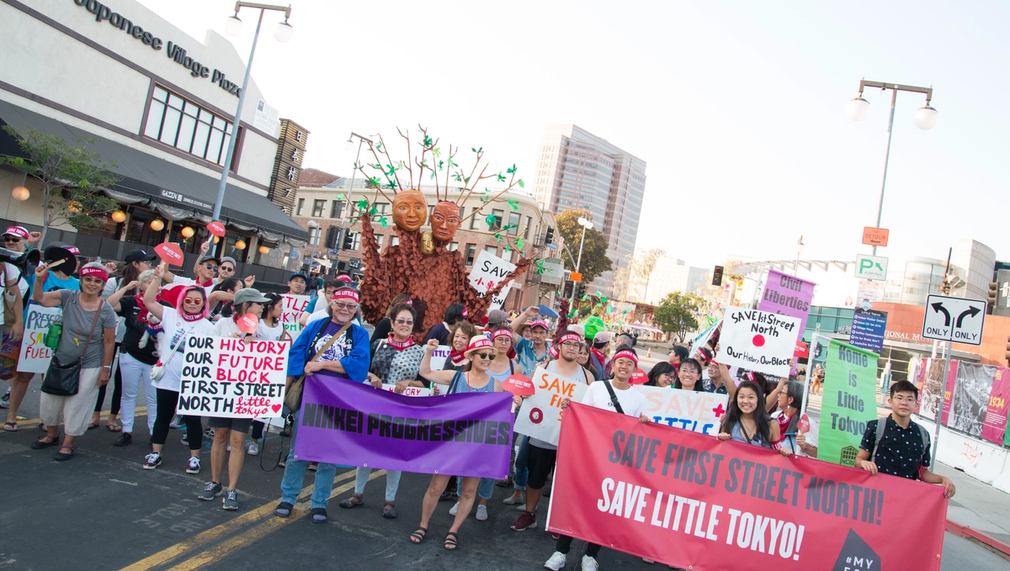Welcome to Little Tokyo: Solidarity with the Unhoused
Our project will create greater awareness around the issues of housing and houselessness impacting Los Angeles’ Little Tokyo neighborhood. We will draw upon a strong, existing collaboration within our neighborhood and its history of community activism to produce a series of pop-up activations to engage stakeholders in understanding the issues of housing/houselessness and imagining a future for our historic Japantown that is inclusive of all.

Please list the organizations collaborating on this proposal.
(1) Little Tokyo Service Center (2) Little Tokyo Community Council
What is the primary issue area that your application will impact?
Housing and Homelessness
In which areas of Los Angeles will you be directly working?
Central LA
In what stage of innovation is this project, program, or initiative?
Expand existing project, program, or initiative
What is your understanding of the issue that you are seeking to address?
In 2020, 41,290 people in the City of LA were experiencing houselessness. When the City removed an encampment of 111 unhoused people from Little Tokyo in March 2022, the community became divided over the safety of visitors and providing help and services for the unhoused. Toriumi Plaza, the site of the Little Tokyo encampment, was named for Union Church of LA’s Reverend Howard Toriumi (1916-1987). The Plazaʻs plaque is inscribed, "He was a dedicated leader who galvanized the community and helped save Little Tokyo from the wrecking ball during the turbulent redevelopment years of the 1960s-1970s. He established several community service organizations that expanded and flourished.” Little Tokyo–the city’s second oldest neighborhood, an inaugural California Cultural District, and one of three remaining historic Japantowns in the US–has a long history of activism. We must act now to help our community understand the issues of housing/houselessness so we remain a welcoming place for all.
Describe the project, program, or initiative this grant will support to address the issue.
Especially after the clearing of Toriumi Plaza in March 2022, housing/houselessness has become a divisive issue in our neighborhood. To educate and raise awareness around this issue, we will expand our signature, community-driven partnership, Sustainable Little Tokyo (SLT), to deepen our existing work with Skid Row organizations such as Los Angeles Community Action Network (LA CAN) and Community Arts Depot. Working together, we will provide local artists with paid opportunities to create arts-based, pop-up activations that deepen our community vision around houselessness, housing, and open space. The first pop-up will be devoted to education and awareness building. The second pop-up will connect residents from the adjacent neighborhoods of Little Tokyo and Skid Row using art and recreation, celebrating Little Tokyo as a historical nexus between Japanese American and Black/African American communities. The final pop-up will temporarily actualize the community’s vision for inclusive public spaces. The pop-ups will take place in Little Tokyo public/open spaces, including Toriumi Plaza. Our project is unique and poised for success because of SLT’s track record in engaging diverse stakeholders to work towards our shared vision for Little Tokyo–which prioritizes affordable and permanent supportive housing–to ensure our neighborhood is welcoming and inclusive for all.
Describe how Los Angeles County will be different if your work is successful.
Since 2021 we have hosted programs to help the Little Tokyo community better understand issues of housing/houselessness. For the two programs in 2021, Skid Row-based LA CAN spoke to the Little Tokyo community about the inadequate housing supply, systemic racism, and income inequality that leads to houselessness. In May 2022, we hosted a roving teach-in through Little Tokyo and Skid Row where participants heard from neighborhood advocates and artists to imagine community-driven ideas and solutions to the housing crisis. Our work, supplemented by staffing to provide ongoing support to the houseless in Little Tokyo, has taken on increased importance following the clearing of people from Toriumi Plaza. We believe that a community-driven approach to identifying temporary and permanent solutions to the housing crisis and lack of open/green space in the area will educate and build awareness, thus ensuring we fulfill the community’s vision of an inclusive Little Tokyo.
What evidence do you have that this project, program, or initiative is or will be successful, and how will you define and measure success?
We utilize tools to review progress, measuring both outputs and outcomes related to the increase in the communityʻs awareness of issues related to housing and houselessness. Quantitative output measures include the number of people engaged in activities, partnerships developed, artists served, and projects started and completed. Quantitative outcome measures analyze increased economic activity and community advocacy results. Outcomes may also be more qualitative, such as reflections on what activities mean to participants and perceptions of how the project raises awareness around the issues. We will also assess the process, specifically the efficacy of outreach and engagement activities. Evaluations will be conducted through the following SLT activities: Annual Retreat Annual Presentation to Partner Boards Quarterly Leadership Meetings Quarterly Steering Committee Meetings Monthly Cabinet Meetings Community Forums, as needed Surveys, interviews, and focus groups, as needed
Approximately how many people will be impacted by this project, program, or initiative?
Direct Impact: 1,500
Indirect Impact: 4,000
Describe the specific role of the partner organization(s) in the project, program, or initiative.
Since 2013, Sustaible Little Tokyo has been a community outreach and engagement effort run by three Little Tokyo institutions: Japanese American Cultural and Community Center (arts and cultural organization), Little Tokyo Services Center (social services organization and community developer), and Little Tokyo Community Council (coalition of residents, businesses, and religious, cultural, and community organizations). We draw upon the strengths of each organization to collaboratively involve stakeholders in meeting our neighborhood’s shared goals: (1) retain and strengthen communities; (2) create economic inclusion; and (3) support green development and practices–while continuing to honor the neighborhood’s deep history as a center for Japanese American communities and culture.